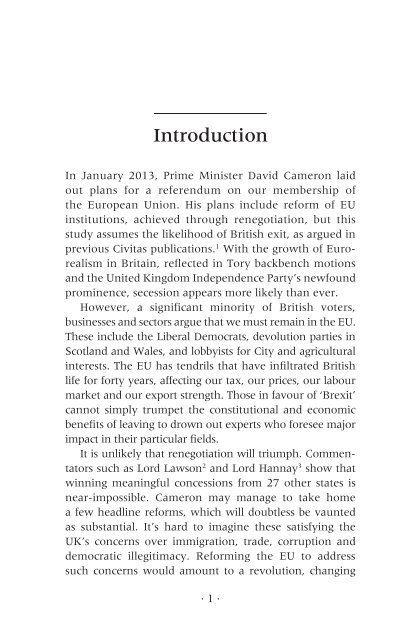IntroductionIn January 2013, Prime Minister David Cameron laidout plans for a referendum on our membership ofthe European Union. His plans include reform of EUinstitutions, achieved through renegotiation, but thisstudy assumes the likelihood of British exit, as argued inprevious Civitas publications. 1 With the growth of Eurorealismin Britain, reflected in Tory backbench motionsand the United Kingdom Independence Party’s newfoundprominence, secession appears more likely than ever.However, a significant minority of British voters,businesses and sectors argue that we must remain in the EU.These include the Liberal Democrats, devolution parties inScotland and Wales, and lobbyists for City and agriculturalinterests. The EU has tendrils that have infiltrated Britishlife for forty years, affecting our tax, our prices, our labourmarket and our export strength. Those in favour of ‘Brexit’cannot simply trumpet the constitutional and economicbenefits of leaving to drown out experts who foresee majorimpact in their particular fields.It is unlikely that renegotiation will triumph. Commentatorssuch as Lord Lawson 2 and Lord Hannay 3 show thatwinning meaningful concessions from 27 other states isnear-impossible. Cameron may manage to take homea few headline reforms, which will doubtless be vauntedas substantial. It’s hard to imagine these satisfying theUK’s concerns over immigration, trade, corruption anddemocratic illegitimacy. Reforming the EU to addresssuch concerns would amount to a revolution, changing· 1 ·
SOFTEN THE BLOWthe fundamentals of each institution. Moreover, Cameronis seen as a wearisome antagonist across much of thecontinent, having frustrated Bulgarian and Romaniangovernments over his anti-immigration rhetoric, spurnedSouthern and Eastern Europe with his efforts to limit theEU budget, and obstructed eurozone consolidation when hewielded the veto over the ‘fiscal compact’. George Osborne,the Chancellor of the Exchequer, has attracted similarill-will through his opposition to EU plans for a financialtransaction tax, a cap on bankers’ bonuses and hostile ruleson bond trading. Taken together, this does not seem thekind of constructive climate needed for fundamental reform.It seems likely, then, that the public will judgeCameron’s renegotiations as superficial at best andvote ‘Out’ when the referendum comes. Even if theConservatives are not in power, a referendum is likelythanks to the ‘Referendum Lock’ that would be triggeredby serious EU treaty change – a likely prospect, given theeurozone’s moves towards fiscal union. James WhartonMP’s Private Members’ Bill, which fell at the final hurdle,also increases the likelihood of a plebiscite in the nearfuture. The issue then becomes the manner of exit. Even ifyou support exit in broad strokes, most accept that certainindustries will be hit hard, depending on the nature ofthe exit agreement (or lack thereof). These individuals,sectors and regions cannot be ignored. It is importantto take their fears seriously, so that the negative impactof ‘Brexit’ can be mitigated as far as possible. With thisin mind, Civitas contacted representatives of those whomight lose out from Brexit, at least in theory, to investigatetheir specific fears. We considered different models for apost-European independent Britain (iBritain) includinga ‘worst case scenario’, as well as the specific policies,treaties, subsidies and actions an iBritish governmentcould take to minimise serious harm to our economy andpeople. Members of the Irish government are already· 2 ·


